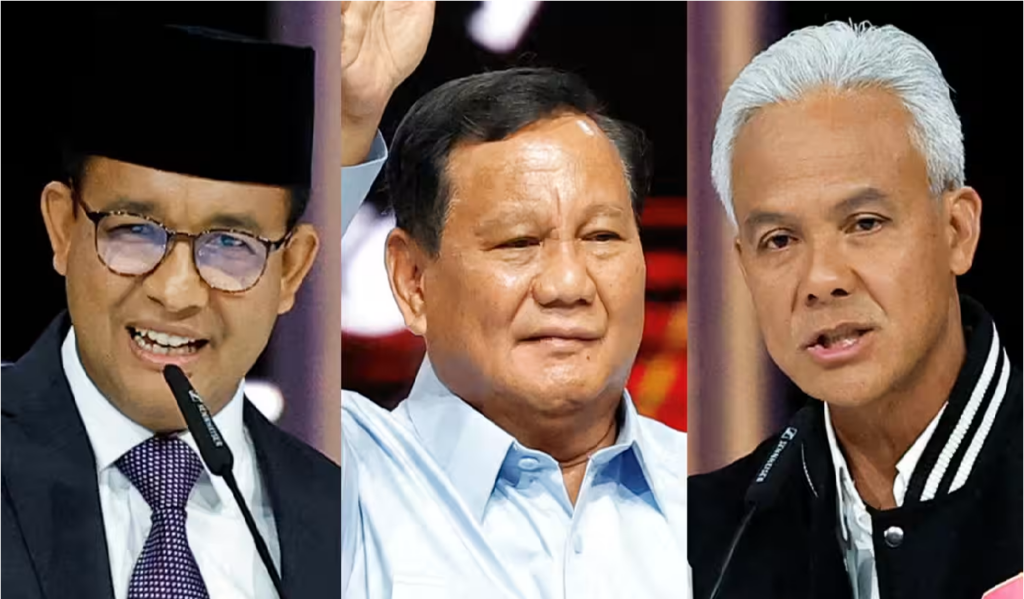
- The outcome of these elections holds significant implications for Indonesia’s democratization, its economic development and the neighbourhood.
- Under Prabowo’s administration, uncertainties loom over the continuity of Jokowi’s initiatives, such as the relocation of the national capital and the ambition to transform Indonesia into a global hub for battery manufacturing.
- Ganjar’s foreign policy stance is pragmatic, focusing on fostering economic partnerships and regional stability.
- Anies’s foreign policy outlook diverges from the traditional approach and prioritises building strategic partnerships based on shared values such as democracy, human rights, and environmental sustainability.
Indonesia’s Defense Minister, Prabowo Subianto, a former army general, has secured an early unofficial lead in the race to become the country’s next president, according to “quick counts” released after voting closed in the world’s third-largest democracy.
With some independent quick counts indicating Prabowo’s share of the popular vote at nearly 60%, substantially surpassing pre-election opinion polls, he emerges as a strong frontrunner. Former Jakarta governor Anies Baswedan follows in second place, garnering just under a quarter of the votes, while the ex-governor of Central Java, Ganjar Pranowo, trails in third, according to snap counts by independent pollsters.
The outcome of these elections holds significant implications for Indonesia’s democratization trajectory and its economic development, potentially shaping Southeast Asia’s largest economy’s path towards attaining developed status by 2045. While official results are yet to be announced, the winner will succeed President Joko Widodo, popularly known as Jokowi, who has served a maximum of 10 years and is not standing for re-election.
Prabowo’s lead, although early, underscores his strong position in the race. His nomination by the Gerindra Party, alongside running mate Gibran Rakabuming Raka, enjoys implicit support from outgoing President Jokowi, despite not receiving explicit endorsement. Gibran’s addition to the ticket, as Jokowi’s eldest son and current mayor of Surakarta, signals continuity in certain policy directions while introducing fresh dynamics to the leadership.
However, uncertainties loom over the continuity of some of Jokowi’s hallmark initiatives, such as the relocation of the national capital and the ambition to transform Indonesia into a global hub for battery manufacturing, under Prabowo’s administration.
Knowing the other Candidates
Ganjar Pranowo, the former governor of Central Java, presents himself as a candidate with deep grassroots connections and an understanding of the people’s needs. Teaming up with Mahfud MD, a former coordinating minister with extensive experience in government, they have garnered support from various political parties, emphasizing social assistance programs and salary increases for public servants. Ganjar and Mahfud position themselves as advocates for ordinary Indonesians, promising to address economic concerns and improve living standards nationwide.
Ganjar’s foreign policy stance is likely to be pragmatic, focusing on fostering economic partnerships and regional stability. With a background in regional governance, he may prioritize cooperation within ASEAN and other regional forums to address common challenges such as climate change and transnational crime. Ganjar’s emphasis on social welfare domestically could also extend to advocating for humanitarian initiatives and development assistance abroad.
Anies Baswedan, a former Jakarta governor, emerges as an independent opposition candidate, challenging the political establishment. Educated in the United States and with a background in academia, Anies brings a fresh perspective to the race. His running mate, Muhaimin Iskandar, a prominent political figure, provides additional credibility to their ticket. Anies and Muhaimin campaign on a platform of justice and prosperity, advocating for the creation of new cities and equal opportunities for small business owners.
Anies’s foreign policy outlook may diverge from the traditional approach, given his academic background and status as an independent candidate. He may prioritise building strategic partnerships based on shared values such as democracy, human rights, and environmental sustainability. Anies could also advocate for a more nuanced approach to regional dynamics, emphasizing Indonesia’s role as a bridge between East and West.
While the outcome of Indonesia’s presidential election has thus far been indicated through quick counts, providing early insights into potential winners, official results are awaited and expected to be announced in approximately a month. However, the significance of this election extends beyond its immediate outcome, as it holds the potential to significantly influence Indonesia’s role within ASEAN and the broader Asian region.
Reference
- https://www.brookings.edu/articles/indonesias-election-reveals-its-democratic-challenges/
- https://www.dw.com/en/indonesia-elections-prabowo-subianto-claims-victory/a-68251339
